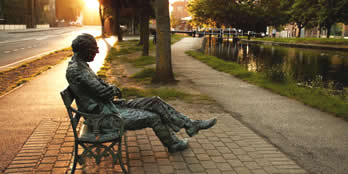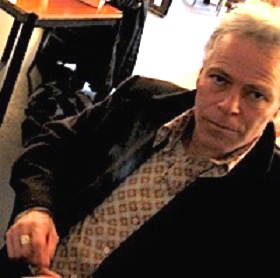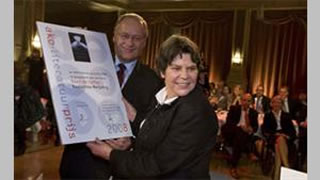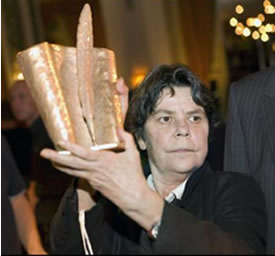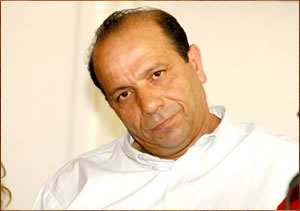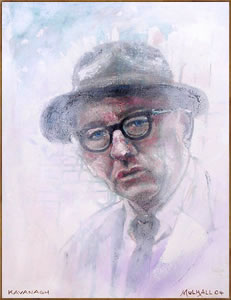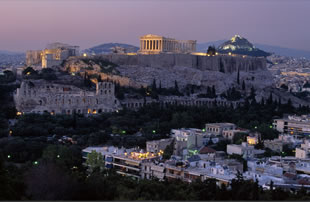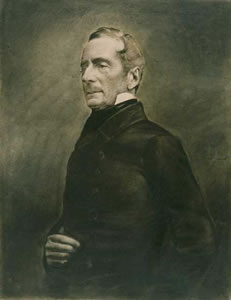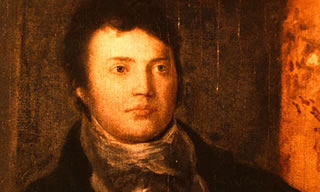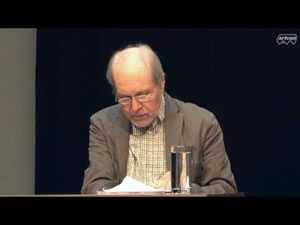De Ierse dichter Patrick Kavanagh werd geboren op 21 oktober 1904 in County Monaghan. Zie ook alle tags voor Patrick Kavanagh op dit blog.
My Father Played The Melodeon
My father played the melodeon
Outside at our gate,
There were stars in the morning east
And they danced to his music.
Across the world bogs his melodeon called
To Lennons and Callans
As I pulled on my trousers in a hurry
I knew some strange thing had happened.
Outside in the cow-house my mother
Made the music of milking,
The light of the stable-lamp was a star
And the frost of Bethlehem made it twinkle.
A water-hen screeched in the bog,
Mass-going feet
Crunched the wafer-ice on the polt-holes –
Somebody wistfully twisted a bellow’s wheel.
My child-poet picked out the letters
On Time’s black stone,
In silver the wonder of a Christmas townland
The winking glitter of a frosty dawn.
Cassiopea was over
Cassidy’s hanging hill.
I looked and three whin bushes rode acoss
The horizon – the Three Wise Kings.
My father played the melodeon,
My mother milked the cows
And I had a prayer like a white rose pinned
On the Virgin Mary’s blouse.
Come Dance with Kitty Stobling
No, no, no, I know I was not important as I moved
Through the colourful country, I was but a single
Item in the picture, the name, not the beloved.
O tedious man with whom no gods commingle.
Beauty, who has described beauty? Once upon a time
I had a myth that was a lie but it served:
Trees walking across the crest of hills and my rhyme
Cavorting on mile-high stilts and the unnerved
Crowds looking up with terror in their rational faces.
O dance with Kitty Stobling I outrageously
Cried out-of-sense to them, while their timorous paces
Stumbled behind Jove’s page boy paging me.
I had a very pleasant journey, thank you sincerely
For giving me my madness back, or nearly.
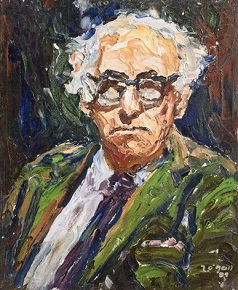
Patrick Kavanagh (21 oktober 1904 – 30 november 1967)
Portret door Liam O’Neill, 1989
De Pakistaanse auteur, journalist en filmmaker Tariq Ali werd geboren in Lahore op 21 oktober 1943. . Zie ook alle tags voor Tariq Ali op dit blog.
Uit: The Book of Saladin
“I have not thought of our old home for many years. It is a long time now since the fire. My house, my wife, my daughter, my two-year-old grandson—all trapped inside like caged animals. If fate had not willed otherwise, I too would have been reduced to ashes. How often have I wished that I could have been there to share the agony.
These are painful memories. I keep them submerged. Yet today, as I begin to write this story, the image of that domed room where every-thing once began is strong in me again. The caves of our memory are extraordinary. Things that are long forgotten remain hidden in dark corners, suddenly to emerge into the light. I can see everything now It comes to my mind clearly, as if time itself had stopped still.
It was a cold night of the Cairo winter, in the year 1181 according to the Christian calendar. The mewing of cats was the only noise fron-the street outside. Rabbi Musa ibn Maymun, an old friend of our family as well as its self-appointed physician, had arrived at my hous on his way back from attending to the Kadi al-Fadil, who had been in disposed for several days.
We had finished eating and were sipping our mint tea in silence, sur rounded by thick, multi-coloured woollen rugs, strewn with cushion covered in silk and satin. A large round brazier, filled with charcoal, glowed in the centre of the room, giving off gentle waves of heat. Reclining on the floor, we could see the reflection of the fire in the dome above, making it appear as if the night sky itself were alight.
I was reflecting on our earlier conversation. My friend had revealed an angry and bitter side, which had both surprised and reassured me. Our saint was human just like anyone else. The mask was intended for outsiders. We had been discussing the circumstances which had compelled Ibn Maymun to flee Andalus and to start on his long fifteen-year journey from Cordoba to Cairo. Ten of those years had been spent in the Maghrebian city of Fez. There the whole family had been obliged to pretend that they were followers of the Prophet of Islam. Ibn Maymun was angered at the memory. It was the decep-tion that annoyed him. Dissembling went against his instincts.
I had never heard him talk in this fashion before. I noticed the trans-formation that came over him. His eyes were gleaming as he spoke, his hand clenched into a fist. I wondered whether it was this experi-ence that had aroused his worries about religion, especially about a religion in power, a faith imposed on the point of a sword. I broke the silence.”
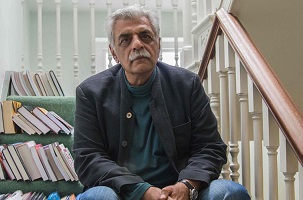
Tariq Ali (Lahore, 21 oktober 1943)
De Griekse dichter en schilder Nikos Engonopoulos werd geboren op 21 oktober 1907 in Athene. Zie ook alle tags voor Nikos Engonopoulos op dit blog.
BOLIVÁR (Fragment)
Yet, how many conspired against you, Bolivár,
How many traps did they not set for you to fall into and vanish,
One man, above all, a rogue, a snake, a native of
Philippoupolis.
But what was that to you, like a tower you stood firm, upright,
before Acongagua’s terror,
Holding a mighty cudgel and wielding it above your head.
The bald-headed condors, unafraid of the carnage and smoke of
battle, took fright and flew up in terrified flocks,
And the llamas hurled themselves down the mountain slopes,
dragging, as they fell, a cloud of earth and rocks.
And into the dark of Tartarus your enemies disappeared, lay
low.
(When the marble arrives, the best from Alabanda, I’ll sprinkle
my brow with Blachernae’s holy water,
I’ll use all my craft to hew your stance, to erect the statue of a
new Kouros in Sikynos’ mountains,
Not forgetting, of course, to engrave on its base that famous
“Hail, passer-by”.)
And here it should above all be stressed that Bolivar was never
afraid, never, as they say, “lost his nerve”,
Not even at the most murderous hour of battle, nor in the bitter
gloom of unavoidable treachery.
They say he knew beforehand, with unimaginable precision, the
day, the hour, even the second: the moment,
Of the Great Battle that was for him alone,
In which he himself would be army and enemy, both
vanquished and victor, triumphant hero and sacrificial
victim.
(And the lofty spirit of such as Cyril Loukaris reared within
him,
How he calmly eluded the despicable plots of the Jesuits and
that wretched man from Philippoupolis!)
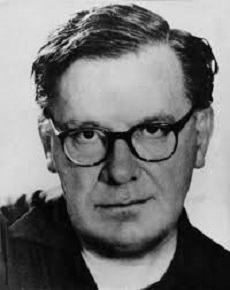
Nikos Engonopoulos (21 oktober 1907 – 31 oktober 1985)
De Frans-Algerijnse schrijver en regisseur Mehdi Charef werd geboren op 21 oktober 1952 in Maghnia in Algerije. Zie ook alle tags voor Mehdi Charef op dit blog.
Uit: A bras le coeur
“– Salam, Si Mbami Si Rachid, mon patron, te prie de lui payer tes dettes…
Il m’ignore. Il reprend son souffle, et enfin il me fixe. À son regard vicieux, aux frottements rugueux de ses mains, à son teint rouge d’émotion qui s’éclaircit lentement, je comprends qu’il va essayer de me faire un coup tordu.
– Tu sais où habitent ces deux filles ?
– Je trouverai…
Je suis surpris mais je réponds sans hésiter. Il s’interroge. Je suis sûr qu’il fantasme. Ça m’amuse… Et si je lui arrangeais le coup ?
– Si Mbami, tu ne serais pas le premier à te les échanger au lit !
Il blêmit, il écarquille ses billes de faux jeton ; les bras lui en tombent ; il s’écrie :
– Quoi?
– C’est Mimoun qui les a initiées à l’amour. Il les enfourchait dans l’orangeraie du colon Perret, ou sous le pont de l’oued Malha ! Mimoun les a draguées à la sortie de l’école, toutes les deux, elles ne se quittent pas. Après le bain au hammam, elles revêtent un haïk qui les camoufle des pieds à la tête et elles s’engouffrent dans l’Aronde de Mimoun qui les attend.
– Les salopes !
– Je te le répète, Si Mbami, je te les ramène quand tu veux!
Il est tout excité, il se voit déjà avec elles.”
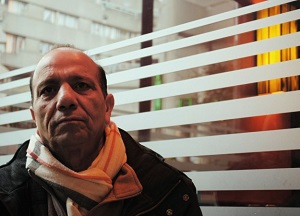
Mehdi Charef (Maghnia, 21 oktober 1952)
De Amerikaanse dichter, schrijver en criticus Allen Hoey werd geboren op 21 oktober 1952 in Kingston, New York. Zie ook alle tags voor Allen Hoey op dit blog.
Uit: Provençal Light, a long poem
After the Orchard: “Souvenir de Mauve” (fragment)
How can I thank Mauve–his early faith, beyond
what a cousin owes. A master of grey, he belongs to the North–brooding,
always the lowering sky, yet I would remember him
brightly for all the grief. And the pretense. Hypocrite!–
“A vicious character,” he called me that day on the dunes–what he meant
but lacked courage to put into words was he would not set foot in the home
I had made with–say it as he would–a whore. How the bourgeois
revile those who ply their trade plainly, and revile
the warmth of two bodies, deny love could kindle between two
when one walked the streets to put food on the table.
For years
I watched them, remote and beautiful, and somehow sad
while beyond sadness. “Sorrow” I called a litho of Sien–that’s the word.
And what if it was after rejection, no less for her than for me,
I admit my portion. “No, never,” the other had said–why should I
believe it? Love, I’d thought, will always will out, as these blossoms
mastering snow and the mistral inch into sun and explode.
And she, pregnant when I found her and again when I left–who knew
the father? Does that deny love? There’s a spark
beyond spirit that draws us, the joy come dawn of a body
drawn full-length beside you, its warmth more than the thin
rays of sun that fall on a quilt in The Hague. I’ve never denied it–
but there was affection, our small intimate moments, the touches
a husband I’m sure reserves for his wife, many though his mistresses be.

Allen Hoey (21 oktober 1952 – 16 juni 2010)
Kingston, New York
De Zwitserse schrijver en criticus Martin Roda Becher werd geboren in New York op 21 oktober 1944. Zie ook alle tags voor Martin Roda Becher op dit blog.
Uit: Tod im Stadion
“Im Stadion angelangt, kannte ich neben dem “Neuesten”, den ich übrigens diesmal nicht besonders fand, bereits jeden, der zu dem Kellerfest Geladenen, das nächsten Samstag stattfinden sollte (ich war nicht eingeladen).
Anscheinend würde in dem Keller eine ungemein glatte Bande beisammen sein. Er freute sich schon darauf und schilderte mir einige Scherzartikel, wie Plastikspinnen und so fort, die er an diesem Abend zu präsenteiren gedenke und von denen er sich umwerfend erheiternde Wirkung versprach.
In einer kalten Garderobe, zu der uns ein alter Wärter den Schlüssel unter vielen Flüchen seinerseits und Beschwichtigungen unsererseits ausgehändigt hatte, zogen wir uns um.
Auch hier erzählte Ellenberger viel. Es war, als ob er sich verpflichtet fühlte, ohne Unterbrechung geistreich zu sein, Es tat meinen Nerven weh. Dabei interessierte ihn meine Person überhaupt nicht. Es war ihm, glaube ich, völlig egal, wessen Ohr seine Spässe vernahm. Was mochte er nur tun, überlegte ich, wenn er allein war.”
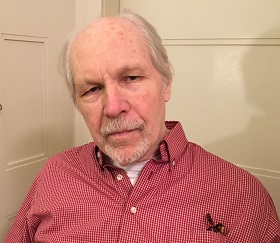
Martin Roda Becher (New York, 21 oktober 1944)
Onafhankelijk van geboortedata
De Indiase schrijver, journalist en essayist Pankaj Mishra werd geboren in 1968 in Jhansi, India. Zie ook alle tags voor Pankaj Mishra op dit blog.
Uit: Tijd van woede (Vertaald door Nico Groen)
“Sinds de Franse Revolutie hadden gefrustreerde mannen allerlei volledig nieuwe politieke stromingen uitgevonden, van nationalisme tot terrorisme. Vele Fransen voelden zich al heel lang gekrenkt door het schrille contrast tussen de glorie van de revolutie en het tijdperk van Napoleon aan de ene kant en de laffe compromissen van het economisch liberalisme en het politieke conservatisme die erop volgden aan de andere. Alexis de Tocqueville had herhaaldelijk opgeroepen tot een groot bezielend avontuur: de ‘overheersing en onderwerping’ van het Algerijnse volk en de stichting van een Frans rijk in Noord-Afrika. Terwijl het einde van de eeuw naderde, klom een onzin uitkramende demagoog, generaal Georges Boulanger, snel op door in te spelen op de massale verontwaardiging over morele schandalen, economische tegenslagen en militaire nederlagen; hij kwam gevaarlijk dicht in de buurt van de macht. In het laatste decennium van de negentiende eeuw, toen de eerste fase van de economische globalisering op stoom kwam, eisten xenofobe Franse politici protectionisme terwijl ze hun pijlen op buitenlandse arbeiders richtten. Boze Fransen slachtten in 1893 tientallen Italiaanse gastarbeiders af. Witte chauvinisten in de Verenigde Staten hadden Chinese arbeiders toen al gebrandmerkt met expliciet racistische wetgeving en retoriek, die net als het tegen de Afro-Amerikanen gerichte segregatiebeleid waren bedoeld om de waardigheid van het groeiende aantal witte loonslaven’ te herstellen. Demagogen in Oostenrijk-Hongarije, die Joden als zondebok aanwezen voor het grootschalige leed dat was veroorzaakt door de anonieme krachten van het mondiale kapitalisme, streefden ernaar de tegen immigranten gerichte Amerikaanse wetten te kopiëren. De toeloop van het Westen op Azië en Afrika aan het einde van de negentiende eeuw toonde aan dat de politieke panacee die Cecil Rhodes bood — ‘wie een burgeroorlog wil voorkomen moet imperialist worden’ — steeds verleidelijker was geworden, vooral in Duitsland, dat, hoewel recentelijk met succes geïndustraliseerd en welvarend, een broedplaats was voor boze, ontevreden burgers en imperialisten in de dop. Aan het begin van de twintigste eeuw, toen de wereld te maken kreeg met de eerste grote crises als gevolg van de globalisering en met de eerste grootschalige internationale migratie uit de geschiedenis, zorgden anarchisten en nihilisten die de individuele wil uit oude en nieuwe kluisters wilden bevrijden voor een uitbarsting van terroristisch geweld. Ze vermoordden talloze staatshoofden, onder wie de Amerikaanse president (William McKinley), naast talloze burgers in overvolle openbare ruimtes. D’Annunzio was slechts een van de vele manipulators in een politieke cultuur die ontstond doordat het Westen overging op industrieel kapitalisme en massapolitiek, door de Indiase dichter Rabindranath Tagore op een tournee door de Verenigde Staten in 1916 een `benauwde, giftige sfeer van wereldwijde achterdocht, hebzucht en paniek’ genoemd.”
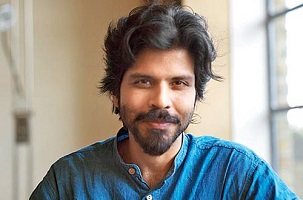
Pankaj Mishra (Jhansi, 1968)

